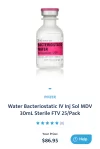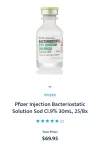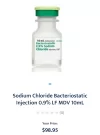Is there any compelling rationale to preferring pharma-grade bacteriostatic water versus the various options available on Amazon? I've been using [this](https://a.co/d/cJAMPEY) product to reconstitute peptides, for example. Just curious if you believe there is a meaningful difference in quality (i.e., am I sacrificing any meaningful amount of peptide degradation by choosing the non-pharma BAC?).
Full disclosure, I've used Amazon sourced BAC from the various no-name suppliers that popped up overnight when they discovered they could sell water and alcohol for $10+ a vial.
When I had to start trading notes with others regarding which BAC was "reliable", not causing pip or reconstitution problems with the same batches of peptides we were using, I decided to dig deeper.
Here's my concern, besides the obvious like "tap water" water being used (which besides the infection threat, contains chlorine and minerals that can easily destroy peptides), or improper PH(should be 5.7) because they don't check, or the wrong amount of benzyl alcohol, all of which have been found in cheap BAC.
You have no way of knowing what kind of water is being used. From what "common knowledge" seems to be, many likely believe distilled water is acceptable, after all, it's "pure". It's not. Others with higher standards think "sterile water" is sufficient. That may help ensure you won't get infected, but that's also not good.
BAC water must be non-pyrogenic.
Pyrogens are microscopic impurities not easily removed (including pieces of bacteria cell wall called "endotoxins"). They cannot be filtered out. Bacteria are enormous by comparison and easily removed with a filter, or killed by the heat of distillation.
Non-pyrogenic water is very hard to make, and a pharma product unto itself.
Pyrogens induce the creation of peptide aggregates, which we don't wan't. Endotoxins can make you sick, albeit that's a low risk in the short term.
It's possible these fly by night companies are making BAC using proper pharma grade "water for injection" and Benzyl Alcohol, filling the vials in an FDA regulated aseptic facility to prevent any from recontaminating the product and simply failed to note that fact, but I have my doubts. I'll bet a not insignificant amount of this stuff is made in someone's garage.
Meanwhile, for $4 a vial US, I can reconstitute $300-$2000 worth of peptides using what I can be certain of is non-pyrogenic, proper PH, proper alcohol content BAC that's been properly made under the oversight of Pfizer and the FDA.
99% of the drug you're injecting is the BAC.







